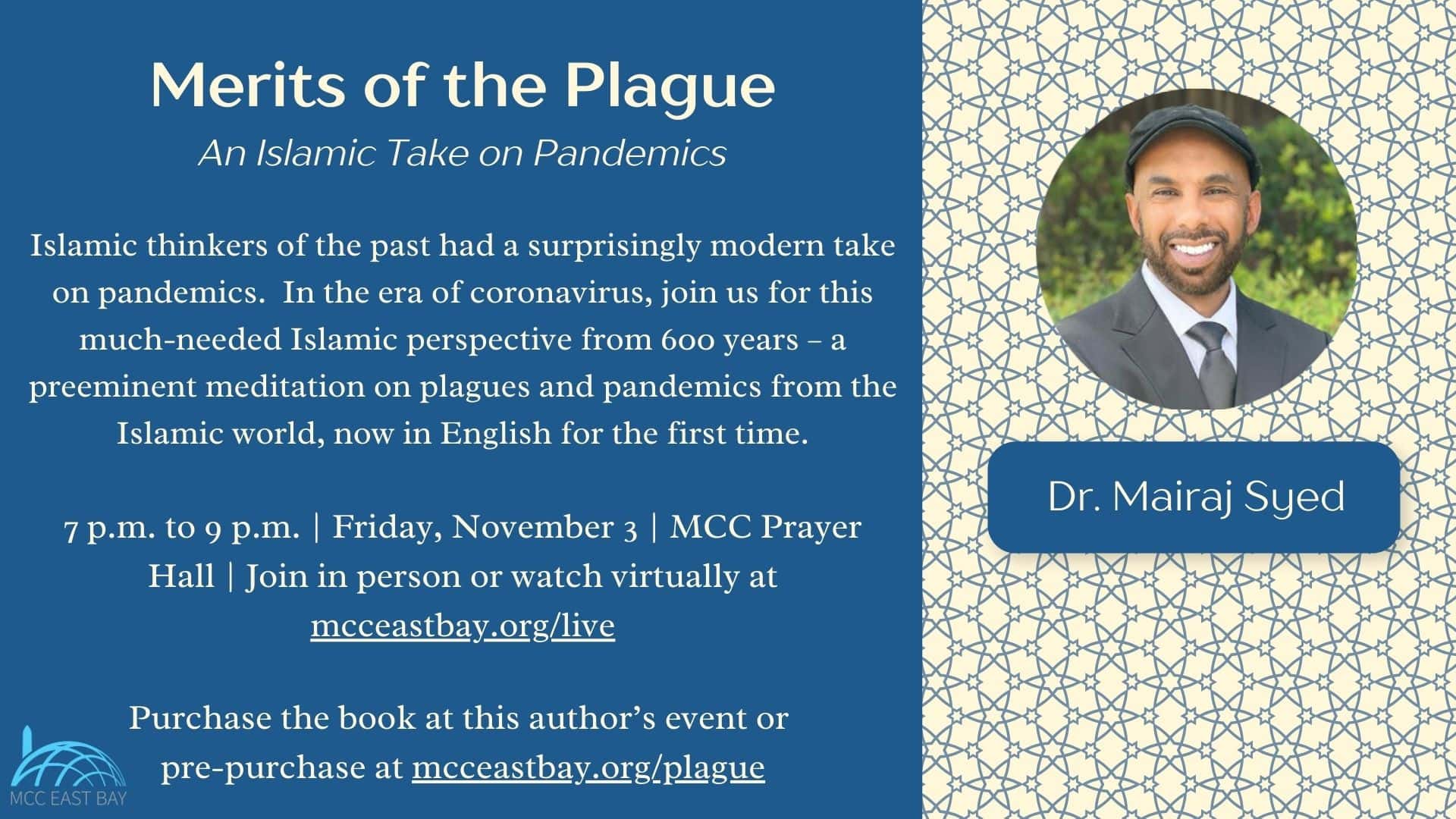Islamic thinkers of the past had a surprisingly modern take on pandemics.
In the era of coronavirus, join us for this much-needed Islamic perspective from 600 years – a preeminent meditation on plagues and pandemics from the Islamic world, newly translated into English for the first time.
7 p.m. to 9 p.m. | Friday, November 3 | MCC Prayer Hall | Join us in person or watch virtually at mcceastbay.org/live
Purchase limited copies of this book at the author’s event or pre-purchase (you will receive a guaranteed copy at the event for signing by the author) at mcceastbay.org/plague
Questions? events@mcceastbay.org
Newly translated, Ibn Hajar al-Asqalani’s unique, non-Western medieval perspective on the Black Death and pandemics in general is a landmark work of history and religious thought.
This spiritual/metaphysical guidance book deals with disease and suffering and is a powerful historical account of the plague in the Muslim world.
ABOUT THE SPEAKER & TRANSLATOR
Mairaj U. Syed is an associate professor at the University of California, Davis, specializing in religious studies and Middle East/South Asia studies. He has published extensively on Islamic law, theology, ethics, and hadith literature, including a book published by Oxford examining the relationship between reason and tradition in Islamic Thought, titled Coercion and Responsibility in Islam. His current research includes computational methods to analyze hadith literature, and he has received numerous grants for his work. He holds an M.A. and Ph.D. in Religion from Princeton University.
ABOUT THE BOOK Merits of the Plague By Ibn Hajar al-Asqalani
Six hundred years ago, the author of this landmark work of history and religious thought—an esteemed judge, poet, and scholar in Cairo—survived the bubonic plague, which took the lives of three of his children, not to mention tens of millions of others throughout the medieval world. Holding up an eerie mirror to our own time, he reflects on the origins of plagues—from those of the Prophet Muhammad’s era to the Black Death of his own—and what it means that such catastrophes could have been willed by God, while also chronicling the fear, isolation, scapegoating, economic tumult, political failures, and crises of faith that he lived through. But in considering the meaning of suffering and mass death, he also offers a message of radical hope. Weaving together accounts of evil jinn, religious stories, medical manuals, death count registers, poetry, and the author’s personal anecdotes, Merits of the Plague is a profound reminder that with tragedy comes one of the noblest expressions of our humanity: the practice of compassion, patience, and care for those around us.
Translated and introduced with notes by Joel Blecher and Mairaj Syed. Published by Penguin Classics.
ABOUT THE AUTHOR
Ibn Hajar al-ʿAsqalani (d. 1449) was a medieval polymath—an innovative religious commentator, a historian and biographer, a judge on the highest court in Cairo, an author of spiritual poetry, and a textile trader from a powerful family of spice merchants. His masterpiece is a twelve-volume commentary on prophetic traditions called Fath al-Bari (Unlocking the Divine Wisdom), parts of which he incorporated into Merits of the Plague.
PRAISE
“Remarkable . . . A landmark work of history and religious thought . . . Surprisingly modern and has a lot to say to us in the era of coronavirus.” —History Unplugged Podcast
“A valuable addition to our understanding of the pandemic and how people reacted to it . . . This book offers a much-needed perspective from the Islamic world.” —Medievalists.net
“A unique, non-Western medieval perspective on the Black Death and pandemics in general.” —Jara News



